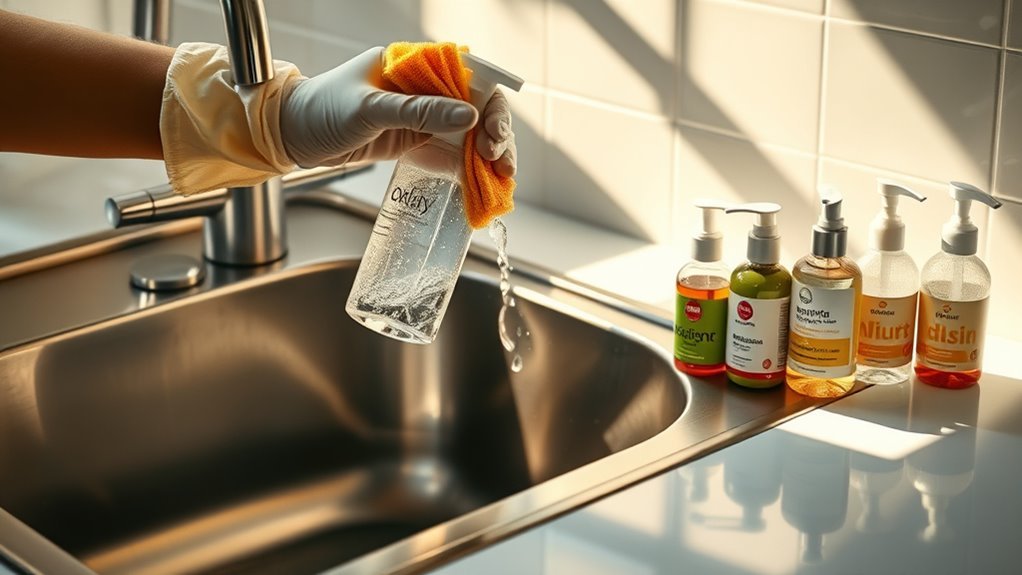Cleaning Techniques for Sink Owners
To keep your sink spotless, rinse it with warm water and wipe it down daily using mild dish soap and a soft cloth to prevent spots and buildup. For soap scum or mineral deposits, try a baking soda paste or a vinegar solution, then dry to avoid water marks. Avoid harsh abrasives, especially on stainless steel or ceramic. Also, clear debris and use strainers to protect your drain. Stick with these basics, and you’ll find even more tips to maintain a fresh, functional sink.
Understanding Different Sink Materials

Choosing the right cleaning method starts with knowing what your sink is made of. If you’ve got a stainless steel sink, you’ll want to avoid harsh abrasives that can scratch its surface. Instead, a gentle cleaner paired with a soft cloth keeps it shiny and free from water spots. On the other hand, ceramic sinks require a bit more care; their smooth, glazed finish can stain or chip if you’re too rough. You’ll want to use non-abrasive, mild cleaners to maintain their bright, classic look. Understanding these materials means you’re not just cleaning—you’re preserving your sink’s freedom from damage and wear. When you treat your sink right, it keeps working smoothly and looking great, freeing you up to enjoy life without worry.
Daily Cleaning Habits for a Sparkling Sink
Although it might seem like a small task, daily cleaning plays a big role in keeping your sink sparkling and hygienic. By incorporating simple daily routines, you free yourself from bigger, tougher cleaning sessions later. After each use, rinse your sink with warm water to wash away any residue. Wipe it down with a soft cloth or sponge to prevent water spots and buildup. Avoid harsh chemicals; a mild dish soap works wonders for daily sink maintenance. Taking these few minutes every day keeps your sink fresh and ready for use, giving you the freedom to enjoy a clean kitchen or bathroom without stress. Sticking to these habits guarantees your sink remains a shining centerpiece effortlessly.
Removing Soap Scum and Mineral Deposits

Keeping up with daily cleaning helps prevent buildup, but soap scum and mineral deposits can still form over time, especially in hard water areas. For effective soap scum removal and mineral deposit prevention, you want to be proactive and use the right methods. Here’s how you can maintain your sink’s freedom from stubborn buildup:
- Use a vinegar and water solution to dissolve mineral deposits.
- Apply a baking soda paste to scrub away soap scum gently.
- Rinse thoroughly with warm water after cleaning.
- Dry the sink with a soft cloth to prevent water spots.
- Consider installing a water softener to reduce mineral buildup.
Tackling Tough Stains and Discoloration
When tough stains and discoloration appear in your sink, simple cleaning methods might not be enough to restore its original look. You’ll need targeted stain removal techniques that get right to the source without damaging the surface. Start by applying a paste of baking soda and water directly to the stain, letting it sit briefly before scrubbing gently with a soft brush. For more persistent discoloration, a diluted vinegar solution can help break down mineral buildup, but be sure to rinse thoroughly afterward. To maintain your sink’s fresh appearance, focus on discoloration prevention by wiping it dry after each use and avoiding harsh chemicals that can wear down the finish. With consistent care, you’ll enjoy a bright, stain-free sink that supports your freedom to live clean and effortlessly.
Natural Cleaning Solutions for Sink Care

After handling tough stains and discoloration, you might want to turn to natural cleaning solutions that are gentle yet effective for regular sink care. These options let you maintain cleanliness without harsh chemicals, giving you freedom to keep your space fresh naturally. Consider these simple ingredients:
- Baking soda: a mild abrasive that lifts grime without scratching.
- Vinegar solution: cuts through mineral deposits and kills bacteria.
- Essential oils: add a pleasant scent and antibacterial properties.
- Citrus peels: naturally deodorize and break down grease.
- Warm water: helps rinse away residues and keeps surfaces shiny.
Using these, you can easily create eco-friendly routines that protect your sink and the environment. Embrace these natural methods for a cleaner, fresher sink that fits your lifestyle perfectly.
Using Commercial Cleaners Safely and Effectively
When choosing a commercial cleaner, make sure it’s suitable for your sink’s material to avoid damage. Always read and follow the safety instructions on the label to protect yourself during use. Wearing gloves and ensuring good ventilation will help you clean effectively and safely.
Proper Cleaner Selection
Although commercial cleaners can make sink maintenance easier, you’ll need to choose the right product to avoid damage and guarantee effective cleaning. Different cleaner types work best for different sink materials and grime levels, so knowing what suits your sink is key to preserving its finish and function. Pay attention to cleaner effectiveness and match it to your specific needs.
Here’s what to evaluate when selecting a cleaner:
- Material compatibility (stainless steel, porcelain, composite)
- Type of dirt or stain (lime scale, grease, rust)
- Environmental impact and biodegradability
- Ease of use and rinsing requirements
- Avoidance of harsh abrasives for delicate surfaces
Choosing wisely lets you maintain your sink’s freedom from damage while keeping it spotless.
Safety Precautions During Use
Picking the right cleaner is just the start—you’ll also want to handle it safely to protect yourself and your sink. Always wear cleaning gloves to shield your skin from harsh chemicals, preventing irritation or burns. Don’t skip this step; your hands deserve protection. Next, prioritize the ventilation importance. Open windows or turn on exhaust fans to keep fresh air flowing, reducing inhalation of fumes that can be harmful or dizzying. Never mix different commercial cleaners, as this can create toxic gases. Follow product instructions precisely—using more won’t speed things up and might damage your sink’s finish. By respecting these safety steps, you maintain your freedom to enjoy a sparkling sink without risking your health or your home’s condition. Safety first lets you clean smarter, not harder.
Preventing Clogs and Maintaining Drain Health
Since sinks are used daily, it’s important to prevent clogs by regularly clearing debris and avoiding pouring grease or large food particles down the drain. Taking charge of your drain maintenance lets you enjoy uninterrupted freedom without costly repairs. Here’s how you can keep your drains flowing smoothly and embrace clog prevention:
Prevent clogs by clearing debris regularly and avoiding grease or large food particles down your drain.
- Use a drain strainer to catch hair and food scraps.
- Dispose of grease in a separate container—never down the drain.
- Flush drains weekly with hot water to dissolve buildup.
- Avoid harsh chemical cleaners; opt for natural solutions instead.
- Schedule regular inspections or cleanings to catch early blockages.
Tips for Keeping Your Sink Fresh and Odor-Free
How often do you think about the smell coming from your sink? Keeping it fresh is simpler than you might believe. By regularly rinsing with hot water, you flush away residue that causes odors. Incorporate sink deodorizing methods like pouring baking soda followed by vinegar down the drain; this natural combo breaks down grime and neutralizes smells. Don’t forget to clean the sink basin and around the drain to prevent buildup. Maintaining sink hygiene also means avoiding pouring grease or food scraps down the drain, as they lead to foul odors over time. With these straightforward habits, you’ll enjoy a fresher, odor-free sink that frees you from worries and keeps your kitchen inviting every day.
Frequently Asked Questions
Can I Use Bleach on All Sink Materials?
You can’t use bleach on all sink materials because it can damage some surfaces like natural stone or certain metals. Instead, consider bleach alternatives like vinegar or baking soda, which are gentler yet effective. If you want to disinfect your sink, look for sink disinfectants labeled safe for your specific material. This way, you’ll keep your sink clean without risking harm, giving you freedom to maintain your space safely and confidently.
How Often Should I Deep Clean My Sink?
Think of deep cleaning your sink like giving it a revitalizing wave of new energy. For best results, follow frequency guidelines by deep cleaning every one to two weeks. Sticking to cleaning schedules helps prevent grime buildup and keeps your sink sparkling. If you use your sink heavily, you might want to clean it more often. This way, you maintain freedom from stubborn stains and keep your kitchen feeling clean and inviting.
Are Ultrasonic Cleaners Safe for Sink Maintenance?
You’ll find ultrasonic cleaners offer great benefits, like removing grime in hard-to-reach spots without harsh scrubbing. They’re gentle on sink materials, making maintenance easier and more effective. However, ultrasonic cleaner limitations include being unsuitable for very large or heavily stained sinks and requiring regular water changes. So, while they’re safe and efficient for routine upkeep, don’t rely on them alone for deep, stubborn dirt—you’ll want other methods too.
What Tools Are Best for Cleaning Sink Drains?
When it comes to cleaning sink drains, you don’t want to let the grass grow under your feet. A drain snake is your best friend for clearing minor clogs, offering freedom from harsh chemicals. For tougher blockages, a plumbing auger dives deeper, breaking through stubborn debris. These tools give you control, so you’re not stuck waiting for a plumber. Grab one, and reclaim your sink’s smooth flow with ease!
Can Vinegar Damage My Sink’S Finish?
You might wonder about vinegar effects on your sink finishes. While vinegar is a natural cleaner, it can damage some finishes if used too frequently or left on too long. Acidic vinegar can dull or corrode delicate surfaces like natural stone, certain metals, or specialty coatings. To keep your sink looking great, test a small area first and avoid prolonged exposure. That way, you maintain your freedom to clean safely without harm.






